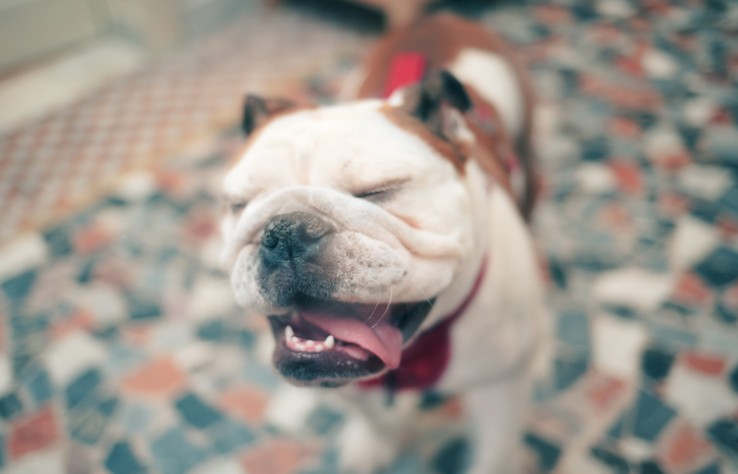
What is Reverse Sneezing in Dogs?
Have you ever seen a dog reverse sneeze? Does your dog do this often? Is it something to worry about?
Reverse sneezing looks scary, especially when you see it happen to your pet for the first time. However, despite its concerning appearance, this symptom isn’t typically a cause for concern on its own. While it can indicate an underlying health problem, reverse sneezing itself is not a risk.
In the article below, you’ll find out more information about reverse sneezing in dogs, what it means, and if there’s anything you can do to help your pet deal with this problem, too.
What is Reverse Sneezing?
Reverse sneezing is the common name for a condition known as inspiratory paroxysmal respiration. This long term simply means that dogs are breathing in quickly when they should be breathing out—basically just like sneezing in reverse.
Reverse sneezing is a condition on its own, but it is not a disease or an illness. It is simply a symptom, and it can sometimes be one that has no known cause.
What Causes a Dog to Reverse Sneeze?
There are many different things that could cause a dog to have a reverse sneeze, here are a few:
Throat Spasms
Throat spasms are one of the potential causes of reverse sneezing in dogs. These spasms occur in the back of the throat and may not have any real cause themselves.
Soft Palate Irritation
If your dog’s soft palate is irritated by something they eat or smell, then they may develop reverse sneezing. This cause is often apparent when reverse sneezing occurs shortly after eating or playing.
Nasal Irritation
Nasal irritation happens when dogs smell something or breath an irritant, like smoke, in their environments. Some dogs are much more sensitive to this type of irritation than others.
Allergies
Allergies are another potential and common cause of reverse sneezing in dogs. Seasonal and pollen allergies are most likely to cause reverse sneezing, but any type of allergy has the potential to do so.
No Known Cause
It is also possible that your dog’s reverse sneezing is simply a behavior that has no known cause. Many veterinarians cannot find the underlying cause of this behavior, and your dog’s health may be perfectly fine with no contributing factors to the reverse sneezing. In this situation, dogs and pet parents must simply get used to the sneezing episodes.
Are There Any Treatments for Reverse Sneezing?
When talking with your veterinarian about your dog’s reverse sneezing they may recommend any of the following options.
Allergy Medication
Allergy medication can work wonders for dogs who have severe enough allergies that reverse sneezing becomes an issue. However, keep in mind that some dogs may not need allergy medication because their allergies are not bad enough. Additionally, if your dog’s reverse sneezing isn’t severe or if it only happens every now and then, your dog may also not be a good candidate for regular allergy medication. Your vet can give you more information about whether this type of treatment is right for your dog.
Steroids
Steroids can help your dog recover from problems relating to the throat or soft palate. They can also help your dog’s body fight allergies more easily and reduce the risk of inflammation in the nose and throat caused by irritants. Your vet will likely only prescribe steroids if nothing else helps and if your dog’s reverse sneezing is severe.
Treating Underlying Problems
Any underlying problems contributing to reverse sneezing must be treated to help reduce the risk of sneezing episodes. Your vet will help you determine any potential underlying causes that could be leading to your dog’s symptoms and will then help you choose the best method of treatment, prevention, or management moving forward.
Stroking the Neck
During your dog’s reverse sneezing episodes, the best way you can help is to gently stroke the back of their neck. This type of petting is calming to dogs and can also help settle the muscle spasms contributing to the reverse sneezing fit. Be sure to remain calm yourself while doing this.
No Treatment
Finally, keep in mind that many vets will simply recommend no treatment, especially in cases where reverse sneezing is uncommon or is not very severe. It may be best to simply just let your dog sneeze in reverse a few times until the episode passes, rather than try to treat it.
Boston Veterinary Clinic is Here to Help with Your Dog’s Reverse Sneezing
Based on this information, you can more easily understand that reverse sneezing isn’t too concerning in your pet. However, if your dog suffers from frequent bouts of reverse sneezing, this may mean they need to be examined by your vet to figure out the underlying cause.
Otherwise, if your dog’s reverse sneezes only happen every now and then, you probably don’t have to worry about taking them to the vet for this problem at all. You can, of course, have your vet check out your dog just to be sure there’s nothing more serious going on under the surface.
Need to book an appointment for your dog at Boston Veterinary Clinic? Use the online form today!